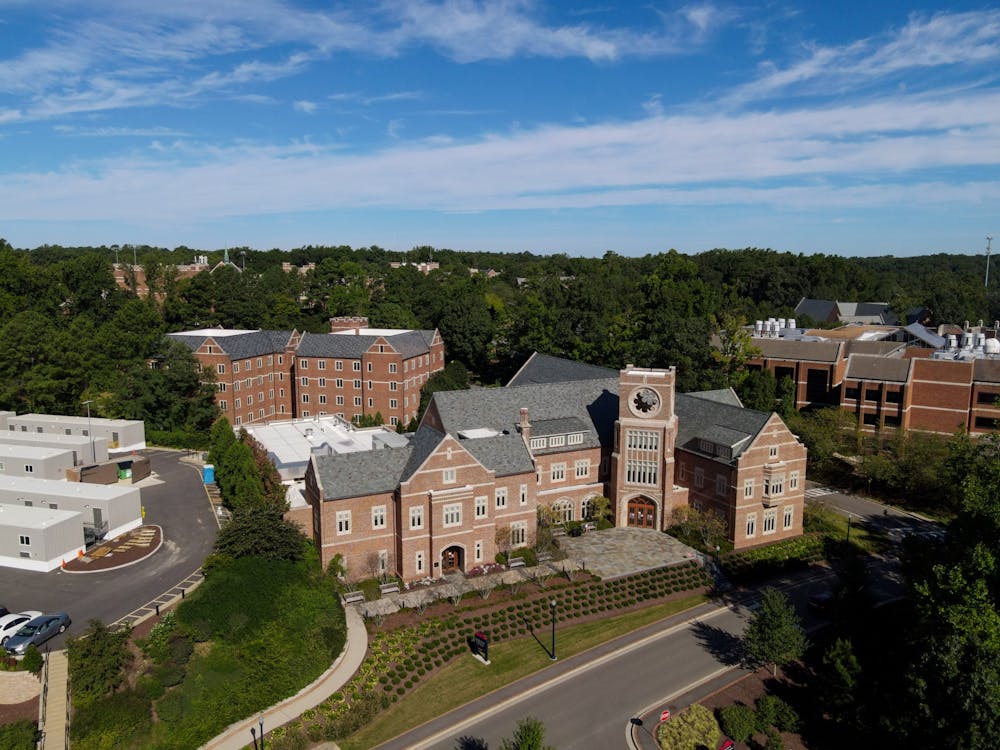Scholars from four institutions that have reckoned with their history agreed that the University of Richmond must commit to long-lasting change beyond renaming buildings at a virtual panel on Sept. 10.
Two days after the removal of the Robert E. Lee statue from Monument Avenue, UR’s Naming Principles Commission and Burial Ground Memorialization Committee sought advice from scholars at neighboring institutions on how to handle naming and memorialization, two topics that sparked protests on campus last year.
Edward Ayers, a former UR president, and Julian Hayter, professor of leadership studies, moderated the discussion among professors from Furman University, the College of William & Mary, the University of Virginia and Washington & Lee University as well as Justin Reid, the director of community initiatives at Virginia Humanities.
Issues surrounding the namesakes of buildings, or the entire universities, emerged at those institutions because of ties to slavery. Jalane Smith, a professor of religious studies at UVA, pointed out the contradiction of Thomas Jefferson, UVA’s founder, in claiming that all men are created equal in the Declaration of Independence, yet making enslaved people build the university.
“History isn’t the same thing as commemoration,” Smith said.
UVA is still in the process of making naming guidelines, but has already named a dormitory after William and Isabella Gibbons who were enslaved in UVA’s grounds, Smith said.
The panelists provided insight behind their institutions’ naming decisions. W&L and Furman decided to keep their names. Similarly to Ryland Hall, Furman was named after two people, Richard and James C. Furman.
Ultimately, the university kept its name but renamed a building named after James who was explicit in his racist views, said Brandon Inabinet, professor of communications studies and chair of Furman’s task force on slavery and justice. Richard continues being the namesake of the university and, like Ryland, he was a Baptist leader who enslaved people.
While all the universities have renamed one or multiple of their buildings, the panelists recommended that UR put effort into long-lasting change through funding and by creating a strong connection with descendant communities.
“If you are really serious about this, you shouldn’t be asking the descendants of enslaved laborers to come and give free labor,” Smith said.
Engaging communities of descendants can take various forms such as having difficult conversations with descendants of enslavers, said Jajuan Johnson, a research associate of W&M’s Lemon Project.
It is also important to understand that descendants are not a monolith, W&L anthropology professor Lynn Rainville said.
Enjoy what you're reading?
Signup for our newsletter
“There is no such thing as the descendant community,” she said. “You can never send enough emails. You can never stop looking and asking because there are always more families.”
UR continues to make decisions on its renaming principles and memorialization of the Westham Burying Ground. The Naming Principles Commission is expected to submit its final recommendations to President Kevin Hallock in Spring 2022, according to UR’s website.
The Burying Ground Memorialization Committee will submit recommendations on a physical memorial on December, according to UR’s website.
Contact investigative and multimedia editor Jackie Llanos at jackie.llanoshernandez@richmond.edu.
Support independent student media
You can make a tax-deductible donation by clicking the button below, which takes you to our secure PayPal account. The page is set up to receive contributions in whatever amount you designate. We look forward to using the money we raise to further our mission of providing honest and accurate information to students, faculty, staff, alumni and others in the general public.
Donate Now



